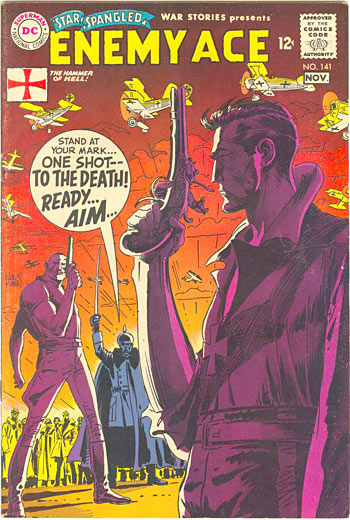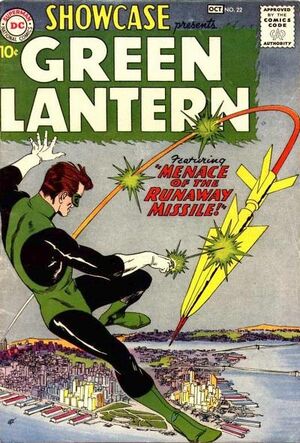OK, for at least tonight I've had it with stimulus, pork, partisan politics.
So I've been thinking that my formative years as a reader almost exactly overlay the so-called Silver Age of comic books (early 1960s-late 1970s), of which I once had a collection of several thousand (most of which went to pay for my undergraduate degree).
And though the Silver Age was essentially defined by Marvel, with the Fantastic Four, Spiderman, X-Men, Hulk, etc. etc., there were some truly outstanding pieces of work published by DC--and even by the third world publishers like Gold Key and Charleton.
So here's what I challenged myself to do: select in each category [DC, Marvel, and the pack] the five indispensable comics I'd want if I ever reconstructed even a part of my collection.
Five... Even with a couple of runners up to cheat with, that's a tall order.
Here's my first nominee--Brave and Bold #79--"Track of the Hook"--Dennis O'Neil script teamed with Neal Adams' pencils before Adams became too full of himself. Tightly plotted, told with cinematic precision, and finished off with ... no real ending:

Adams and O'Neil later got a lot more press and adulation with the Green Lantern/Green Arrow combination that was, quite frankly, too self-consciously relevant to be entertaining. Adams really cut his teeth with the original Deadman series, which was a half-a-book feature in Strange Adventures for about a dozen issues. There is a similarity in this to Jim Steranko's rise to prominence doing half-book stories for Nick Fury, Agent of SHIELD at about the same time. When Adams and O'Neil presented what they considered the series finale (but DC would never allow Deadman to be really killed), Adams took a shot at Steranko, who was getting more attention at the time. Deadman enters a cave from which strange vapors were rising, which--just coincidentally--spelled out Hey, A Jim Steranko Effect.
[I'd also nominate Adams' work in Spectre #4 and #5 as among his best, even though fans were not happy with him replacing Murphy Anderson as the book's artist.]
Much earlier, with a cover by Carmine Infantino but interior art by Alex Toth, was one of the exceptional team-ups of all time, also in Brave and Bold (#53): Atom and the Flash in The Challenge of the Expanding World. This was (I think) a Bob Haney script, but whoever wrote it, represented one of the best sf-themed hero team-ups published in the 1960s:

Perhaps one of the finest illustrator/story-tellers in comics history is a category reserved for the likes of Jack Kirby or ... in this case: Joe Kubert. Kubert earned his greatest notoriety during this period for his long-lasting stint with Sergeant Rock, but I think his very best work came either with his four-issue retelling of ERB's first Tarzan novel, or--and this is the winner--his gut-wrenching World War One adventure series Enemy Ace.
Not only visually brilliant, Enemy Ace mixed gorgeous dogfights with melancholy psychological drama. There are any number of great stories, but here's the one that's probably my all-time favorite from Star-Spangled War Stories (#141) The Bull:

Equally influential but arguably far more uneven in his body of work was Gil Kane. At his best, Kane's work was stylistic genius; at the mediocre end, Kane could be horribly disappointing. A lot of his hack work appeared under the Marvel logo in the 1970s (although at least two Conans were better than the work of Barry Smith, whose run he temporarily interrupted), but his work with Green Lantern throughout the 1960s and early 1970s was among my favorites--especially those stories featuring alien Green Lantern Tomar Tu. I can't find my favorite cover (Green Lantern #37), but this one--the pilot from Showcase #22 ("Menace of the Runaway Missile")--captures the graceful essence of his better work:

My final choice is Superman #167, featuring the very first team-up of Lex Luthor and Braniac against the Man of Steel with pencils (I think, but memory fails here) by Curt Swan. This was one of the very first Superman comics I ever read, and the quality of the story and the good lay-outs explain why later Superman stories left me cold (until Jack Kirby took over the pencils on the Jimmy Olsen books). This is a keeper if you can find it:

This is obviously a very subjective list. If I had given myself a few more picks, aside from the Spectre numbers mentioned above, I'd have included Challengers of the Unknown #66 (an early Mike Friedrich script), Secret Six #5, Brave and Bold #81 (Batman and Flash by Bob Haney and Neal Adams "But Bork can hurt you!"), Adventure Comics #346 (Legion of Superheroes, introducing the Karate Kid), and Steve Ditko's The Creeper #1 (which represented a late attempt to recall his Spiderman glory, but which had an intriguing edge to it)....
Tomorrow, my favorite third world comics of the Silver Age, followed by Marvel....
So I've been thinking that my formative years as a reader almost exactly overlay the so-called Silver Age of comic books (early 1960s-late 1970s), of which I once had a collection of several thousand (most of which went to pay for my undergraduate degree).
And though the Silver Age was essentially defined by Marvel, with the Fantastic Four, Spiderman, X-Men, Hulk, etc. etc., there were some truly outstanding pieces of work published by DC--and even by the third world publishers like Gold Key and Charleton.
So here's what I challenged myself to do: select in each category [DC, Marvel, and the pack] the five indispensable comics I'd want if I ever reconstructed even a part of my collection.
Five... Even with a couple of runners up to cheat with, that's a tall order.
Here's my first nominee--Brave and Bold #79--"Track of the Hook"--Dennis O'Neil script teamed with Neal Adams' pencils before Adams became too full of himself. Tightly plotted, told with cinematic precision, and finished off with ... no real ending:

Adams and O'Neil later got a lot more press and adulation with the Green Lantern/Green Arrow combination that was, quite frankly, too self-consciously relevant to be entertaining. Adams really cut his teeth with the original Deadman series, which was a half-a-book feature in Strange Adventures for about a dozen issues. There is a similarity in this to Jim Steranko's rise to prominence doing half-book stories for Nick Fury, Agent of SHIELD at about the same time. When Adams and O'Neil presented what they considered the series finale (but DC would never allow Deadman to be really killed), Adams took a shot at Steranko, who was getting more attention at the time. Deadman enters a cave from which strange vapors were rising, which--just coincidentally--spelled out Hey, A Jim Steranko Effect.
[I'd also nominate Adams' work in Spectre #4 and #5 as among his best, even though fans were not happy with him replacing Murphy Anderson as the book's artist.]
Much earlier, with a cover by Carmine Infantino but interior art by Alex Toth, was one of the exceptional team-ups of all time, also in Brave and Bold (#53): Atom and the Flash in The Challenge of the Expanding World. This was (I think) a Bob Haney script, but whoever wrote it, represented one of the best sf-themed hero team-ups published in the 1960s:

Perhaps one of the finest illustrator/story-tellers in comics history is a category reserved for the likes of Jack Kirby or ... in this case: Joe Kubert. Kubert earned his greatest notoriety during this period for his long-lasting stint with Sergeant Rock, but I think his very best work came either with his four-issue retelling of ERB's first Tarzan novel, or--and this is the winner--his gut-wrenching World War One adventure series Enemy Ace.
Not only visually brilliant, Enemy Ace mixed gorgeous dogfights with melancholy psychological drama. There are any number of great stories, but here's the one that's probably my all-time favorite from Star-Spangled War Stories (#141) The Bull:

Equally influential but arguably far more uneven in his body of work was Gil Kane. At his best, Kane's work was stylistic genius; at the mediocre end, Kane could be horribly disappointing. A lot of his hack work appeared under the Marvel logo in the 1970s (although at least two Conans were better than the work of Barry Smith, whose run he temporarily interrupted), but his work with Green Lantern throughout the 1960s and early 1970s was among my favorites--especially those stories featuring alien Green Lantern Tomar Tu. I can't find my favorite cover (Green Lantern #37), but this one--the pilot from Showcase #22 ("Menace of the Runaway Missile")--captures the graceful essence of his better work:

My final choice is Superman #167, featuring the very first team-up of Lex Luthor and Braniac against the Man of Steel with pencils (I think, but memory fails here) by Curt Swan. This was one of the very first Superman comics I ever read, and the quality of the story and the good lay-outs explain why later Superman stories left me cold (until Jack Kirby took over the pencils on the Jimmy Olsen books). This is a keeper if you can find it:

This is obviously a very subjective list. If I had given myself a few more picks, aside from the Spectre numbers mentioned above, I'd have included Challengers of the Unknown #66 (an early Mike Friedrich script), Secret Six #5, Brave and Bold #81 (Batman and Flash by Bob Haney and Neal Adams "But Bork can hurt you!"), Adventure Comics #346 (Legion of Superheroes, introducing the Karate Kid), and Steve Ditko's The Creeper #1 (which represented a late attempt to recall his Spiderman glory, but which had an intriguing edge to it)....
Tomorrow, my favorite third world comics of the Silver Age, followed by Marvel....

Comments
I never was a big DC fan; Adams' work on the AVENGERS (the "Kree-Skrull War") was fabulous stuff. Absolutely mind-blowing. Then he did a few issues of X-MEN before the title went into reprints (before GIANT-SIZE X-MEN #1). One of the most realistic artists ever.